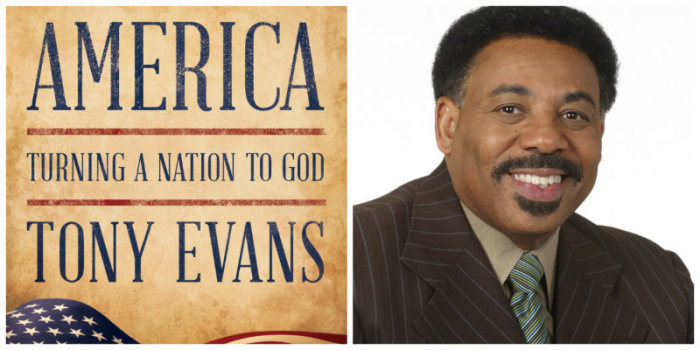'God and His Rule Is America's Only Hope,' Says Pastor Tony Evans as He Calls Christians to Repentance
Dr. Tony Evans, senior pastor of Oak Cliff Bible Fellowship and president of The Urban Alternative, insists in a new book that blame for the social ills Americans are experiencing partly fall on the shoulders of Christians, who have compromised with the culture and helped marginalize God — therefore shutting out access to His transformational presence and power.

"America is in serious trouble," Evans writes in America: Turning a Nation to God. "From sea to shining sea we are witnessing the devolution of a nation."
Listing "family breakdowns to the immigration crisis to the abiding racial divide" as well as "the redefinition of marriage and the family, abortions on demand" as examples of the nation's "unraveling," Evans adds that "the American dream is quickly becoming the American nightmare" for those disillusioned with the country's direction.
"In the midst of all this, God's church seems to be of little help in giving real answers to real problems in spite of the proliferation of Christian literature, programming, and facilities. In fact, the Christian faith and its symbols are more marginalized than ever," the Dallas, Texas, pastor writes.
Evans calls the Christian church "an unintentional co-conspirator in the culture's demise through its compromise with the culture ..."
There could only be two possible explanations for America's tragic state, as far as Evans is concerned: the world is on the cusp of witnessing Christ's return and earthly reign, or the nation is "enduring the passive wrath of God ..." He explains, "The more people marginalize the true God of the Bible the more chaotic things become."
But all is not lost — if America, led by the church, turns to God in repentance.
"God and His rule is America's only hope; and the church operating under His authority is the means for the realization of that hope, since it alone has been given the keys of the Kingdom (Matthew 16:18-19)," writes Evans.
In a phone interview with The Christian Post, Dr. Evans explained how he believes Christians have marginalized God, commented on the lack of bold leaders in the pulpit, and discussed how he has been working to impact communities across the country through developing school-church partnerships.
The transcript below has been edited for clarity.
CP: Is it correct that the point of your message in America is that many of the ills present in our society fall on the shoulders of Christians, and that for society to improve, Christians need to improve their relationship with God?
Evans: Well, sort of. The problem is that God is being dismissed from the culture and that vacuum is allowing, or is the basis for the deterioration of society. That is because Christians have not kept Him in the center of the culture. Unless we bring Him back to the center of the culture, we will continue to see this devolution, devolving and chaotic environment that we're living in, because our specific job is to keep Him at the center of the culture.
CP: How have Christians marginalized God?
Evans: First of all, by refusing or failing to become disciples. Disciples are people who operate under the rule of God, and if we're not operating under the rule of God, we can't expect the broader society to take God seriously. So Christians have become fans rather than followers, and therefore we gather in our fan club on a weekly basis. But in terms of our decisions being controlled by [our] commitment? That's not happening. So we've become secularized and we've become marginalized and therefore God has become marginalized and therefore there is the result of deterioration.
CP: Can you name an example of this deterioration that you're referencing and perhaps an example or two of how this problem could be solved?
Evans: Well, you take the racial crisis that we're facing today all over the country. Because Christians are disunified across racial lines, we do not model before the culture or have a unified voice to speak to that issue. And until we come together and demonstrate and model that presence, but not only model that presence in a worship service, but by doing good works that benefit the community together ...
Our main good work that we do is help churches adopt public schools. We get churches across racial lines to adopt the same public schools in their community, and to provide mentoring, tutoring and family-support services. When you do that cross-racially, then people can see the productivity of the Christian presence in their community. So we're calling on Christians to do that along with having a solemn assembly. A solemn assembly is a sacred gathering where, one, you call the Christians together to call God's presence back into our midst and in the midst of the culture, and then you do good works to demonstrate that presence.
CP: It seems discussions within in the Christian community about this "racial crisis" you say we're experiencing today have revealed areas of mistrust, biases, even prejudices that Christians hold toward one another. How do you even get Christians to a sacred assembly, when it seems we still have these hangups, for lack of a better term?
Evans: That becomes a leadership issue because a mist in the pulpit is a fog in the pew, so you've got to get leaders to accept the fact that we have failed, to come together, and then to bring their congregations with them. Because unless you get the leadership to be responsible as leaders, then you can't expect the followership to go ahead of them and to be more productive than they are. So it's a leadership issue in the community of the church.
CP: There was a recent gathering featuring Dr. John Piper and a few other folks (called "A Time to Speak") in which they discussed some of these issues. Piper said that there were a lot of cowards in the pulpit, that many leaders are not bold enough. What are you thoughts on that? Are leaders being bold enough nowadays?
Evans: No, I do not think we're being bold enough. One, because we're not biblical enough, therefore we don't have the basis of being bold enough. We have a low view of God, so we don't challenge people, and we've often missed our calling. We have satisfied that with growing membership, not growing disciples. And if we're not growing disciples into Kingdom disciples, people who are representing God's interest in every category of life, then God does not have good representation. … You can't blame things for being dark if the light bulbs aren't working. So we're complaining about the darkness when the bulbs aren't working, and the Bible says that we are the light of the world. It's the pulpit's weakness in creating disciples that has led to this problem.
CP: Based on what we're seeing nowadays in society, in terms of push-back against the exclusivity that Christians claim, do you really think the kind of impact that you're envisioning could happen even if Christians for the most part were to get together and do what they're supposed to do?
Evans: Absolutely, because then you would have re-invited God into the culture. Second Chronicles 15:3-6 says that in those days there was no true God, no teaching priest, and no law. It goes on to say that there was chaos in society, and then it says, 'For God troubled them with every kind of distress.' If God is your problem, only God is your solution. It doesn't matter who you elect. If God can't get the attention of the church house, He's certainly not going to stop by the White House. So the issue is then when God returns, what returns with Him? And what returns with Him is the power to override what is happening in the culture.
CP: In America, you share how your church, Oak Cliff Bible Fellowship, has been implementing a Kingdom agenda in the local community through school partnerships. Please talk a little more about the National Church Adopt-a-School Initiative.
Evans: Here locally in Dallas at our church, we've adopted some 50 schools where we're providing mentoring, tutoring and family-support services to the average student in those schools. We've then codified what we're doing and now we're training churches all over the country on what it means to adopt a school, how to adopt a school, the services you supply to the school, the ministry to the students and their families and how you do it as a group of churches so that every school gets adopted. Because now, you're taking a weight off of the teachers and administrators socially so that they can focus on the academic development. And that has provided positive presence in the communities where they've adopted this initiative. It's something that can be done anywhere, because every community has churches, schools, and families. We provide this training, we try to bring the churches together around this common vision, we're calling them to have their own community-wide solemn assembly, to do this good work, and then to have a voice of courage about what is taking place in their community.
CP: Any final thoughts about America that you want to get across to readers?
Evans: Until we take seriously God's definition of the church and stop just "having church," we will not see transformation in our society. And if Christ doesn't come back, we are watching the disintegration of a nation before our eyes, unless we step out and bring God back front and center by having a unified movement of developing Kingdom disciples.
--
Dr. Tony Evans, in addition to serving as senior pastor of 10,000-member Oak Cliff Bible Fellowship, is founder and president of The Urban Alternative, described as "a national ministry dedicated to restoring hope in personal lives, families, churches and communities."




























